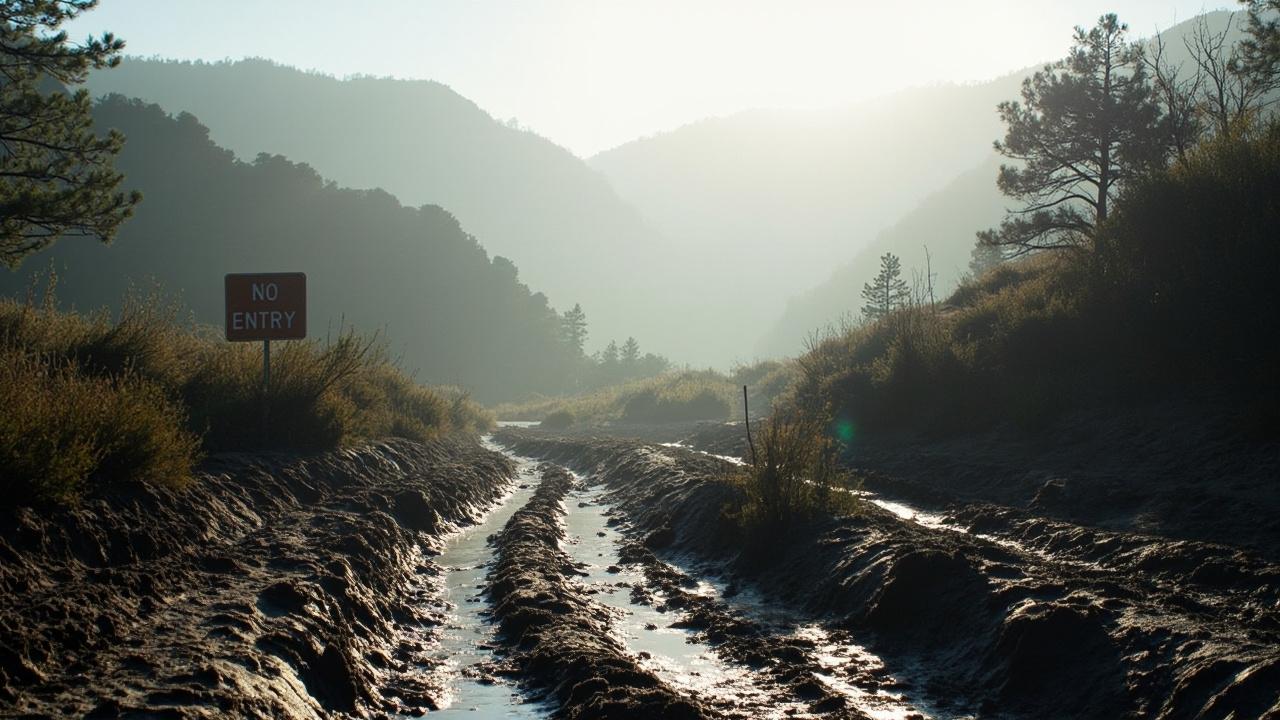Opening Hook
Azusa Canyon off-roading violations can turn a thrilling adventure into a legal nightmare. The canyon, with its rugged beauty and challenging trails, beckons off-road enthusiasts seeking an adrenaline rush amidst stunning scenery. Imagine the roar of your engine echoing through the mountains, the wind in your hair as you navigate rocky terrain, and the satisfaction of conquering a difficult climb. This is the allure of Azusa Canyon, a siren song for those who crave off-road excitement.
However, this off-road paradise also has its pitfalls. What starts as a fun day can quickly devolve into a stressful encounter with law enforcement if regulations are ignored. The thrill of the ride can sometimes overshadow the importance of adhering to the rules, leading to unintended consequences. While the spirit of adventure is encouraged, ignorance of the law is not an excuse, and the price for that ignorance can be steep.
Many off-roaders, caught up in the moment, make seemingly small mistakes that result in citations or even arrests. These errors can range from unknowingly venturing into restricted areas to exceeding noise limits or failing to have the proper vehicle registration.
It’s crucial to understand that Azusa Canyon, while offering a sense of freedom, operates under a specific set of rules designed to protect both the environment and the safety of its visitors. Let’s explore some of the most common missteps that can lead to legal trouble and how to avoid them.
The Law of the Land
The first step to enjoying Azusa Canyon responsibly is understanding who governs the area. Jurisdiction isn’t always straightforward, and multiple agencies often play a role. Primarily, the US Forest Service manages much of the land within the Angeles National Forest, which encompasses Azusa Canyon.
They are responsible for enforcing federal regulations related to natural resources, environmental protection, and land use. However, the Los Angeles County Sheriff’s Department also has a significant presence, enforcing state laws and local ordinances, including traffic laws and regulations concerning public safety. Understanding which agency has authority in a specific area is critical, as it dictates which set of rules apply.
Permitted and Restricted Areas
Knowing where you can and cannot drive is paramount. Azusa Canyon features designated off-roading areas, and venturing outside these zones can lead to serious trouble. These areas are typically marked with signs, but it’s your responsibility to confirm boundaries. Restricted areas might include sensitive habitats, waterways, or private property.
Always consult official maps provided by the US Forest Service to identify approved trails and avoid inadvertent trespassing. Failing to do so may result in hefty fines or even vehicle impoundment due to azusa canyon off-roading violations. Remember, ignorance of the law is not a valid excuse.
Vehicle Requirements and Regulations
Beyond designated areas, specific vehicle requirements apply. All vehicles must be properly registered and display valid license plates. Spark arrestors are often mandatory to prevent wildfires. Depending on the area, certain equipment, like functional mufflers to control noise, may also be required. Modifications that increase a vehicle’s noise output beyond legal limits are generally prohibited.
Additionally, safety gear like helmets and seatbelts are often mandatory, and the requirements change, so make sure that you continue to check on current regulations to ensure a safe trip. Speed limits are strictly enforced within Azusa Canyon, and exceeding them is a common cause for citations.
Noise regulations are also in place to protect the environment and nearby residents from excessive noise pollution. Failing to comply with these requirements can lead to fines, warnings, or even the impoundment of your vehicle.
Common Azusa Canyon Off-Roading Violations and Their Penalties
Azusa Canyon, while a haven for off-road enthusiasts, is also a hotspot for various violations that can lead to significant penalties. One of the most common offenses is trespassing, which occurs when individuals venture into restricted areas or onto private property within the canyon.
These areas are often clearly marked with signage, yet some off-roaders either disregard or fail to notice these warnings. The penalties for trespassing can range from hefty fines to vehicle impoundment, depending on the severity of the infraction and the discretion of law enforcement.
Another prevalent issue is the operation of unregistered vehicles. All vehicles used for off-roading in Azusa Canyon must be properly registered and permitted according to California state law and any specific local regulations. This ensures that vehicles meet certain safety standards and that their owners are accountable for their actions.
Operating an unregistered vehicle can result in fines, and in some cases, the vehicle may be impounded until proper registration is obtained. It is crucial for off-roaders to ensure their vehicles are in compliance before hitting the trails.
Noise violations are also frequently encountered. Many residents who live near Azusa Canyon have registered noise complaints. Azusa Canyon is subject to noise regulations designed to protect both the environment and the peace and quiet of nearby communities. Exceeding established decibel limits can lead to fines and may even require modifications to the vehicle to reduce noise output. A significant contributor to noise violations are individuals who disregard the azusa canyon off-roading violations already in place.
Operating a vehicle under the influence of alcohol or drugs carries particularly severe consequences, including potential jail time, significant fines, and a criminal record. Furthermore, causing environmental damage through actions such as destroying vegetation, littering, or disturbing wildlife can also result in substantial fines and potential requirements to restore the damaged areas. Reckless driving, characterized by operating a vehicle in a manner that endangers others, carries serious legal consequences, including potential jail time and a criminal record.
The Environmental Impact
Azusa Canyon’s allure extends beyond adrenaline rushes and challenging trails; it encompasses a delicate and intricate ecosystem susceptible to the impact of off-road vehicle use. This natural environment, characterized by its unique flora, fauna, and geological formations, is under constant threat from irresponsible off-roading activities.
Actions such as driving over fragile vegetation, creating new trails where they don’t exist, and disturbing wildlife can have long-lasting and detrimental effects on the canyon’s biodiversity and overall health.
The consequences of neglecting these environmental considerations are far-reaching. Soil erosion, a significant concern, occurs when vehicle tires churn up the earth, removing protective layers and leading to increased runoff during rainfall. This runoff carries sediment into waterways, polluting them and harming aquatic life.
Furthermore, noise pollution from modified exhaust systems can disrupt animal behavior, impacting their ability to hunt, mate, and raise their young. It is imperative that off-roaders understand the consequences of their actions and how these activities contribute to the degradation of Azusa Canyon’s fragile landscape.
Responsible stewardship requires a commitment to minimizing one’s footprint. Understanding the impact of azusa canyon off-roading violations and adhering to established guidelines are paramount to preserving the area’s ecological integrity. This means staying on designated trails, avoiding sensitive areas, properly disposing of waste, and respecting wildlife. By embracing a mindset of conservation, off-roaders can ensure that Azusa Canyon remains a vibrant and healthy natural space for current and future generations to enjoy.
Case Studies
Imagine Sarah, a relatively new off-roader eager to test her skills in Azusa Canyon. She had a capable vehicle but hadn’t thoroughly researched the designated areas. Excited by a challenging-looking trail she saw branching off the main road, she ventured onto it, unaware that it was a restricted area clearly marked with signage that she failed to notice.
A patrolling ranger soon encountered her, resulting in a trespassing citation. The fine was hefty, and Sarah also faced points on her driving record, a stark reminder that unfamiliarity with the rules is no excuse. She learned a valuable lesson about the importance of pre-trip planning and observation.
Then there’s the story of Mark and his friends, who brought their modified trucks to Azusa Canyon for a weekend of fun. They were blasting music from their vehicles and revving their engines, enjoying the adrenaline rush. Unfortunately, their noise levels far exceeded the legal limits, drawing the attention of law enforcement.
Each of them received noise violation citations, and Mark had to spend a significant amount of money to modify his exhaust system to comply with the regulations. This incident not only cost them money but also tarnished their reputation within the off-roading community, highlighting the necessity of respecting noise ordinances. These types of azusa canyon off-roading violations are surprisingly common.
Another cautionary tale involves David, who, after a few celebratory beers, decided to take his ATV for a spin around his campsite. He thought he was being discreet, but a sheriff’s deputy spotted him. David was arrested for operating a vehicle under the influence, facing serious legal consequences, including potential jail time and a suspended driver’s license.
His experience serves as a powerful warning against mixing alcohol or drugs with off-roading, no matter how tempting it might seem. These cases, though fictionalized, represent common scenarios that emphasize the legal and personal consequences of irresponsible off-roading in Azusa Canyon.
| Violation | Consequences | Lesson Learned |
|---|---|---|
| Trespassing in restricted area | Hefty fine, points on driving record | Thoroughly research designated areas before off-roading. |
| Exceeding noise limits | Noise violation citation, expense of modifying exhaust system | Respect noise ordinances. |
| Operating ATV under the influence | Arrest, potential jail time, suspended driver’s license | Never mix alcohol or drugs with off-roading. |
But I Didn’t Know!
Many off-roaders, when faced with a citation in Azusa Canyon, often resort to common excuses in an attempt to justify their actions or plead ignorance. While understandable, these excuses rarely hold water in a court of law.
It’s crucial to understand that as an off-roader, you’re responsible for knowing and abiding by all applicable regulations, regardless of whether you personally saw a sign or understood the specifics. Claiming ignorance is not a get-out-of-jail-free card.

The Ubiquitous “I Didn’t See the Sign” Defense
One of the most frequent excuses is “I didn’t see the sign.” This usually refers to posted warnings about restricted areas, speed limits, or other regulations. However, the burden of awareness lies squarely on the operator of the vehicle.
Courts generally operate under the principle that laws and regulations are publicly accessible, and it’s the responsibility of individuals to familiarize themselves with them before engaging in an activity. Simply claiming you didn’t *see* a sign doesn’t absolve you of responsibility, especially if due diligence wasn’t performed before heading out.
The “My GPS Told Me To” Misdirection
In the age of readily available GPS technology, another common defense is “My GPS told me to go that way.” While GPS devices can be valuable navigational tools, they are not infallible guides to legality. They can be outdated, inaccurate, or simply not programmed with the specific regulations of a particular area in mind.
Relying solely on a GPS and ignoring posted signs or established boundaries is not a valid excuse for trespassing or any other violation. Responsible off-roaders always cross-reference their GPS data with official maps and signage to ensure compliance with the law and to avoid azusa canyon off-roading violations.
The “I Didn’t Know That Area Was Restricted” Ploy
Finally, many individuals claim that they were unaware that a particular area was restricted. This excuse often arises when off-roaders inadvertently cross into protected habitats or private property. However, ignorance of the law is no excuse, as the saying goes.
It’s the responsibility of every off-roader to research and understand the permitted areas and restricted zones before venturing into Azusa Canyon. Official maps, regulations posted online, and information available at ranger stations are all valuable resources that can help prevent unintentional violations. Responsible off-roading requires proactive planning and a commitment to staying informed.
Protect Yourself
To ensure a safe and legal off-roading experience in Azusa Canyon, proactive planning and adherence to regulations are essential. Before heading out, conduct thorough research to understand the specific rules and guidelines in place. This includes identifying designated off-roading areas, vehicle requirements, and any temporary restrictions that may be in effect.
Obtain all necessary permits and registrations for your vehicle, and make sure your vehicle complies with equipment and modification regulations. Familiarize yourself with maps of Azusa Canyon and use GPS devices or other navigational tools to ensure you remain within permitted areas.
Before you even think about hitting the trails, arm yourself with knowledge. Check the US Forest Service website or contact the local ranger station for the most up-to-date information. Don’t rely solely on outdated information or hearsay. Having the correct facts on hand will significantly reduce your risk of unintentional azusa canyon off-roading violations.
Furthermore, ensure you have the right equipment. A well-stocked first aid kit is crucial for addressing injuries. Communication devices, like a satellite phone or a two-way radio, can be lifesavers in areas with limited cell service.
Remember to:
Beyond legal compliance, responsible off-roading involves minimizing your environmental impact. Always practice “Leave No Trace” principles by packing out everything you pack in, staying on established trails, and avoiding disturbing wildlife or vegetation. Be mindful of noise levels and avoid excessive revving or loud music that could disturb other visitors or wildlife.
And of course, never operate a vehicle under the influence of alcohol or drugs. Impairment not only puts yourself and others at risk but also carries significant legal consequences.
Azusa Canyon Off-Roading Violations
Navigating the legal landscape of off-roading can be daunting, especially in a popular destination like Azusa Canyon. Fortunately, several resources are available to help enthusiasts stay informed and compliant. Understanding where to find accurate information and assistance can make the difference between a thrilling adventure and a costly legal headache. Many organizations are dedicated to preserving access to off-road trails while promoting responsible use.
Here’s a list of valuable resources to consult:
- US Forest Service Website: The official website of the US Forest Service is an excellent starting point. Search for information specific to the Angeles National Forest (where Azusa Canyon is located) to find detailed regulations, maps of designated off-roading areas, and any temporary closures or restrictions.
- Local Ranger Station: Contacting the local ranger station directly can provide real-time updates on trail conditions, fire restrictions, and any recent changes to regulations. Rangers can also answer specific questions about permitted activities and necessary permits.
- Los Angeles County Sheriff’s Department: For law enforcement-related inquiries or to report azusa canyon off-roading violations, the Los Angeles County Sheriff’s Department is the primary point of contact. They can provide information on local ordinances and the consequences of illegal off-roading activities.
- Off-Roading Clubs and Organizations: Joining a local off-roading club or organization can offer access to a wealth of knowledge and experience. These groups often host workshops on responsible off-roading practices, trail maintenance events, and advocacy efforts to protect access to public lands.
Facing serious charges related to off-roading violations can be stressful. If you find yourself in this situation, seeking legal counsel from an attorney experienced in off-roading laws is highly recommended. A qualified attorney can assess the specifics of your case, explain your rights, and provide guidance on the best course of action.
Furthermore, understanding the complexities of environmental regulations, especially those pertaining to the sensitive ecosystem of Azusa Canyon, is crucial in avoiding potential legal issues. Ignoring these regulations can result in substantial fines and other penalties.
Conclusion
Azusa Canyon offers an unparalleled off-roading experience, a chance to test your skills against nature’s challenges while surrounded by breathtaking scenery. However, the freedom and thrill of navigating its rugged terrain come with a significant responsibility: adherence to the law.
Ignorance is not bliss, especially when it comes to off-roading regulations; failing to understand and respect these rules can lead to hefty fines, vehicle impoundment, and even more serious legal repercussions. Remember, protecting this unique environment and ensuring its availability for future generations depends on the choices we make today.
Ultimately, the key to enjoying Azusa Canyon’s off-roading opportunities lies in being informed, prepared, and responsible. Take the time to familiarize yourself with the specific regulations governing the area, ensure your vehicle is properly registered and equipped, and always prioritize safety and environmental protection.
Be mindful of noise levels, stay within designated areas, and leave no trace of your visit. By adopting these practices, you not only minimize your risk of facing azusa canyon off-roading violations, but also contribute to preserving the canyon’s natural beauty for everyone to appreciate.
Let’s all commit to off-roading responsibly. Share this information with your fellow off-road enthusiasts, encourage them to prioritize safety and compliance, and together, let’s ensure that Azusa Canyon remains a haven for adventure seekers while respecting the law and protecting this invaluable natural resource. The future of responsible off-roading in Azusa Canyon depends on each and every one of us.
Frequently Asked Questions
What constitutes an off-roading violation in Azusa Canyon?
An off-roading violation in Azusa Canyon generally involves operating a vehicle in areas not designated for vehicular traffic, such as driving on unmarked trails, crossing streams without authorization, or venturing into restricted ecological zones. Damage to vegetation, soil erosion, and disturbing wildlife habitats can also constitute violations.
Furthermore, any activity that disregards posted signage or instructions from authorities is likely to be considered an offense.
Are there specific areas within Azusa Canyon where off-roading is prohibited?
Yes, certain areas within Azusa Canyon are specifically off-limits to off-roading vehicles. These areas often include riparian zones along the river, steep hillsides prone to erosion, and locations designated as sensitive wildlife habitats.
Prohibited zones may also encompass areas where motorized vehicle access is restricted to protect archaeological sites or maintain public safety. These restrictions are put in place to preserve the delicate ecological balance of the canyon.
What are the typical penalties for off-roading violations in Azusa Canyon?
The penalties for off-roading violations in Azusa Canyon can vary depending on the severity of the offense. Typical penalties may include fines, which can range from a few hundred to several thousand dollars, particularly for repeated or egregious violations.
Additionally, offenders may face vehicle impoundment, community service requirements, or even criminal charges in cases involving significant environmental damage or disregard for public safety.
How is off-roading activity monitored and enforced in Azusa Canyon?
Off-roading activity in Azusa Canyon is monitored and enforced through a combination of methods. Park rangers and law enforcement officers patrol the area, conducting regular checks for illegal off-roading. They may use vehicles, foot patrols, and surveillance equipment to detect violations. Additionally, public reporting and cooperation play a role, as individuals can report suspicious activity to the authorities.
What types of vehicles are subject to off-roading regulations in Azusa Canyon?
The off-roading regulations in Azusa Canyon apply to a wide range of vehicles, including but not limited to trucks, SUVs, ATVs (all-terrain vehicles), and motorcycles. Any motorized vehicle capable of traversing unpaved terrain is generally subject to these regulations.
The key factor is not just the type of vehicle, but also where it is operated within the canyon and whether the activity complies with established rules and guidelines.









